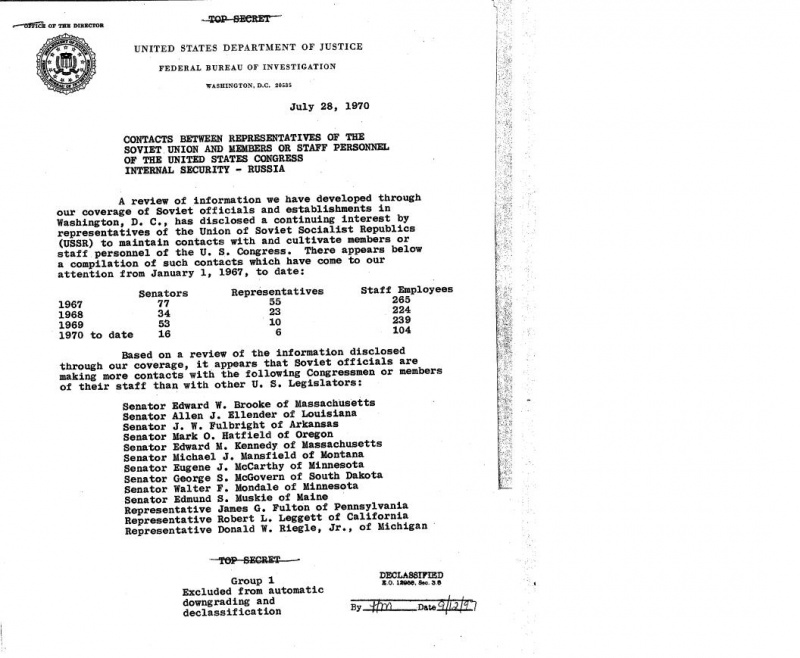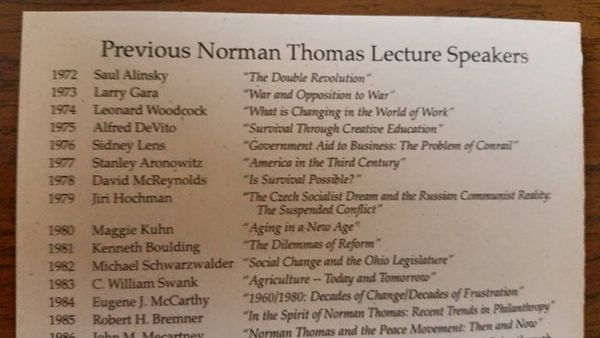Eugene McCarthy
Eugene McCarthy
Lowenstein influence
In 1967, Allard Lowenstein convinced Senator Eugene McCarthy to challenge Lyndon Johnson in the Democratic primaries. McCarthy demonstrated that anti-war politics could be winning politics and brought along Robert Kennedy, not to mention hundreds of thousands of new political activists.[1]
F.B.I. Soviet contacts memo
On July 28, 1970, the F.B.I. issued a top secret memo entitled CONTACTS BETWEEN REPRESENTATIVES OF THE SOVIET, UNION AN MEMBERS OR STAFF PERSONNEL OF THE UNITED STATES CONGRESS INTERNAL SECURITY - RUSSIA
The memo stated;
- A review of information we have developed through our coverage of Soviet officials and establishments in Washington, D. C., has disclosed a continuing interest by representatives of the Union of Soviet Socialist Republics (USSR) to maintain contacts with and cultivate members or staff personnel of the U. S. Congress. There appears below a compilation of such contacts which have come to our attention from January 1, 1967, to date:
Senators
- 1967 77
- 1968 34
- 1969 53
- 1970 to date 16
Representatives
- 1967 55
- 1968 23
- 1969 10
- 1970 to date 6
Staff Employees
- 1967 265
- 1968 224
- 1969 239
- 1970 to date 104
- Based on a review of the information disclosed through our coverage, it appears that soviet officials are making more contacts with the following Congressmen or members of their staff than with other U. S. Legislators
- Senator Edward W. Brooke of Massachusetts
- Senator Allen J. Ellender of Louisiana
- Senator J. W. Fulbright of Arkansas
- Senator Mark O. Hatfield of Oregon
- Senator Edward M. Kennedy of Massachusetts
- Senator Michael J. Mansfield of Montana
- Senator Eugene J. McCarthy of Minnesota
- Sena tor George S. McGovern of South Dakota
- Sena tor Walter F. Mondale of Minnesota
- Sena tor Edmund S. Muskie of Maine
- Representative James G. Fulton of Pennsylvania
- Representative Robert L. Leggett of California
- Representative Donald W. Riegle, Jr., of Michigan
- Group 1
- Excluded from automatic downgrading and declassification
The document was declassified on September 12, 1997
Political Rights Defense Fund
As at July 22, 1975, Eugene McCarthy served on the Advisory Board of the New York based Political Rights Defense Fund.[2]
Norman Thomas lecture
Eugene McCarthy gave the Norman Thomas lecture for 1984.
IPS "who's who"-20th anniversary celebrations
By its second decade the Institute for Policy Studies had built up considerable influence in the U.S. government.
According to Information Digest[3]the Institute for Policy Studies celebrated its 20th anniversary with an April 5, 1983, reception at the National Building Museum attended by approximately 1,000 IPS staffers and former staff.
In addition to 1960s folk songs by Josh White, Jr. and a bluegrass band, consisted of an underdone "roast" of IPS leaders Marcus Raskin and Richard Barnet hosted and chaired by IPS trustee Paul C Warnke, head of the U.S. Arms Control and Disarmament Agency and chief SALTII negotiator for the Carter Administration. Zoe Mikva, wife of Congressman Abner Mikva handled arrangements . The "roasting" was urdertaken by former Senator George McGovern, Rep. Ron Dellums, Ralph Nader, lesbian activist and author Rita Mae Brown, Village Voice cartoonist Jules Feiffer, Harry Belafonte and Cora Weiss, substituting for IPS board chairman Peter Weiss.
Many of IPS's current and former Capitol Hill friends attended or were represented by members of their staff. Among those serving on the IPS 20th Anniversary Comittee chaired by Paul C. Warnke were Senators Chris Dodd {D-CT} and Gary Hart (D. CO) with an endorsement provided by Senator Mark Hatfield {R OR}.
Former Senators on the committee included James Abourezk, recently an IPS Trustee, Birch Bayh, Frank Church, William Fullbright, Eugene McCarthy and Gaylord Nelson.
The Congressional IPS comittee members included Les Aspin {D. WI}, George E Brown, Jr. (D.CA}, Philip Burton (D.CA), George Crockett (D-MI}, Ron Dellums (D.CA}, former Texas Congressman Robert Eckhardt, Don Edwards {D.CA}, Chairman of the Subcommittee on Civil and Constitutional Rights, Tom Harkin {D-IA}, Robert Kastenmeier (D. WI}, Chairman of the Subcomittee on Courts, Civil Liberties and the Administration of Justice, George Miller (D-CA}, Richard Ottinger {D-NY}, Leon Panetta (D-CA}, Henry Reuss (D.WI}, Chairman of the Joint Economic Committee, Patricia Schroeder {D.CO}, John Seiberling (D.OH} and Ted Weiss {D.NY}.
Among those attending were Victor Navasky and Christopher Hitchens of The Nation, Abner Mikva, appointed by president Carter to the U.S. Court of Appeals, philanthropist Philip Stern and Rep. Robert Kastenmeier. Among the well-advertised "no shows" were Bianca Jagger, who has been lobbying Congress with the assistance of the Washington Office on Latin America and the CISPES-Committee in Solidarity with the Peoples of El Salvador, against U.S. aid to El Salvador and for aid to the Sandinistas; and Atlanta Mayor and former U.N. Ambassador Andrew Young.
Members of the IPS 20th Anniversary Comittee included:
David Aberswerth, Gar Alperovitz, David Baltimore, Mayor Marion Barry, Norman Birnbaum, Conrad Cafritz, Peggy Cooper Cafritz, Dr. Helen Caldicott, Charles Caldwell, Lillian Calhoun, David Carley, Lisle Carter, Jr., Noam Chomsky, Dr. Mary Coleman, Catherine Conover, Dr. Franklin Davis, Diana DeVegh, Dr. James Dixon, Leonard Dreyfus, Celia Eckhardt, William Fitzgerald, Nancy Folger, Yolande Fox, Dr. Jerome Frank, Robert Freedman, Clayton Fritchey, John Kenneth Galbraith, Cherif Guellal, Mark Green, Dean Charles Halperin, Sidney Harman, W. Averell Harriman, Terry Herndon, Seymour Hersh, Karl Hess, Sonya Hoover, Richard Hubbard, David Hunter, Ivan Illich, Christopher Jencks, Vernon Jordan, Jr. Patricia King, Gabriel Kolko, Adm. Gene LaRocque, Dr. E. James Lieberman, Dr. Robert Jay Lifton, Philip Lilienthal, Sally Lilienthal, Edgar Lockwood, Franklin Long, Dr. Reginald Lourie, Ira Lowe, Dr. Bernard Lown, Michael Maccoby, Harry Magdoff, Louis Martin, Hilda Mason, Anthony Mazzochi, Dorothy McGhee, Rt. Rev. Paul Moore, Jr., Sidney Morgenbesser, David Morris, very Rev. James Parks Morton, Stephen Muller, Eleanor Holmes Norton, Ara Oztemel, Grace Paley, Charles Peters, Dean Ronald Pollack, David Ramage, Jr., Earl Ravenal, Cary Ridder, Mitchell Rogovin, Florence Roisman, Maurice Rosenblatt, Charles Savitt, Andre Schiffrin, Stephen Schlossberg, Mark Schneider, Herman Schwartz, Herbert Semel, John Sewell, Richard Sobol, Ralph Stavins, Ben Stephansky, Philip Stern, Studs Terkel, Michael Tigar, Michael Trister, Dr. George Wald, Peter Weiss, Stanley Weiss, Jerome Wisner, Gary Wills, William Winpisinger, Andrew Young and Anne Zill.
Supported by Council for a Livable World
The Council for a Livable World, founded in 1962 by long-time socialist activist and alleged Soviet agent, Leo Szilard, is a non-profit advocacy organization that seeks to "reduce the danger of nuclear weapons and increase national security", primarily through supporting progressive, congressional candidates who support their policies. The Council supported Eugene McCarthy in his successful Senate run as candidate for Minnesota.[4]
References
- ↑ Democratic Left, Spring 2005
- ↑ Political Rights Defense Fund letter to supporters signed by Syd Stapleton
- ↑ Information Digest April l5, 1983 p77-79
- ↑ CLW website: Meet Our Candidates

